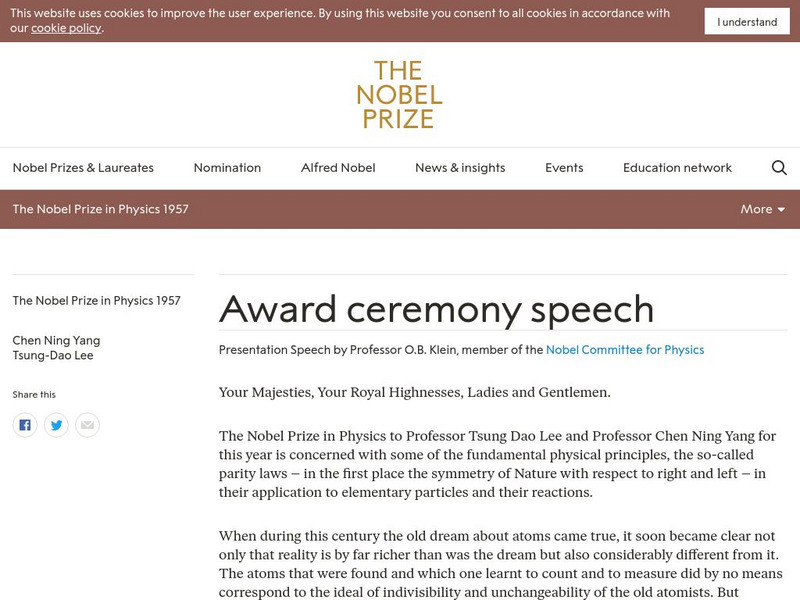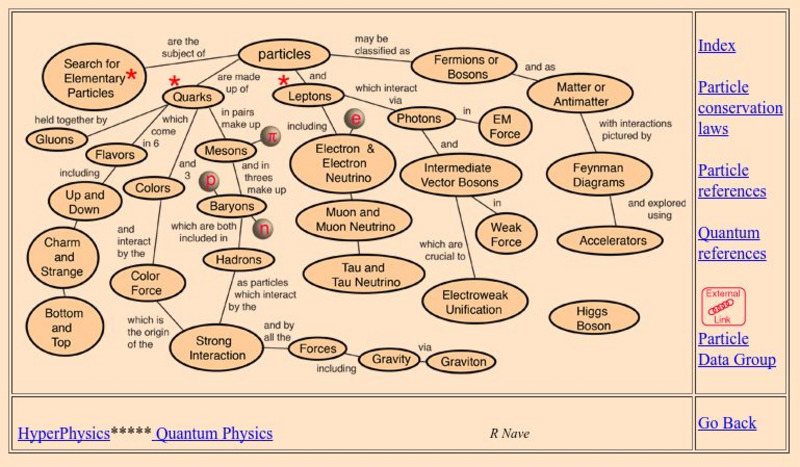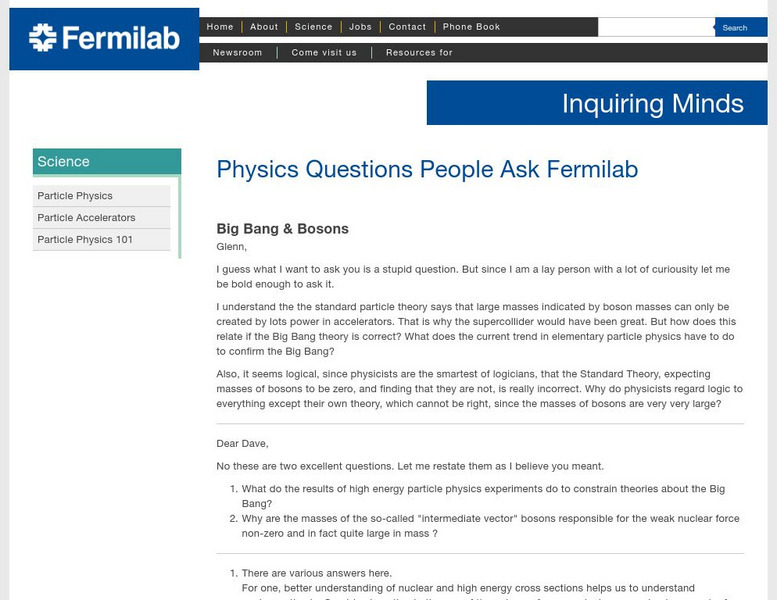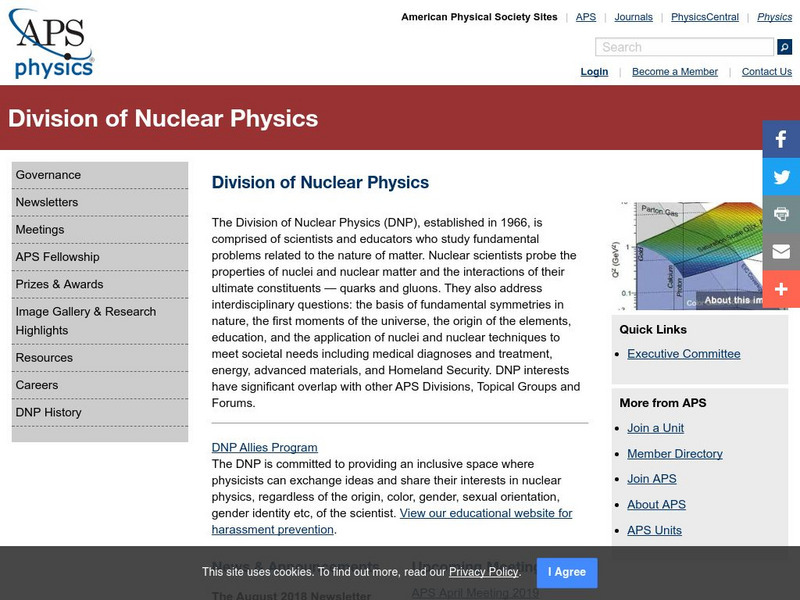Symmetry Magazine
Symmetry Magazine: Explain It in 60 Seconds: Quarks
Quarks, described here, are particles of matter that cannot be further broken down. Thus they are called fundamental particles. "Explain It In 60 Seconds" is an article series that aims to summarize in a few paragraphs the meaning of...
Symmetry Magazine
Symmetry Magazine: Explain It in 60 Seconds: Cherenkov Light
Cherenkov light is explained here as the light emitted when a charged particle travels through matter faster than light would be able to. This would be slower, however, than the maximum speed of light, which occurs in a vacuum. "Explain...
Symmetry Magazine
Symmetry Magazine: Explain It in 60 Seconds: Neutrino Masses
Neutrinos, described here, are particles scientists still have a lot to learn about. They are trying to measure their masses. "Explain It In 60 Seconds" is an article series that aims to summarize in a few paragraphs the meaning of...
Khan Academy
Khan Academy: Step 1 (Particle Under Gravity)
This program simulates a particle falling due to gravity. Try changing the initial settings. What do you think will happen if you... Increase gravity? Change the mass of the particle? Make the time step negative?
Khan Academy
Khan Academy: Particle Collisions
Test your understanding of how to simulate the collision of two particles with this 8-problem quiz/practice.
Khan Academy
Khan Academy: Particle Calculations
Apply what you've learned to calculate the position and velocity of a particle over time with this 8-problem quiz/practice.
Symmetry Magazine
Symmetry Magazine: Explain It in 60 Seconds: W Boson
The W boson, described here, is important in the study of the differences between matter and antimatter. "Explain It In 60 Seconds" is an article series that aims to summarize in a few paragraphs the meaning of different concepts in...
Symmetry Magazine
Symmetry Magazine: Explain It in 60 Seconds: Z Boson
The Z boson, described here, is important in the study of electroweak force. "Explain It In 60 Seconds" is an article series that aims to summarize in a few paragraphs the meaning of different concepts in particle physics.
Physics Aviary
Physics Aviary: Thermal Speed Lab
This lab is designed to have students learn the factors affecting the RMS velocity for a sample of gas. The student will be able to set the temperature of the environment and the mass of the particles.
Other
Cern: The Particle Detector Briefbook
A glossary of terms used in experimental particle physics. Claims to be a "handbook" or "briefbook" for all of the complicated concepts found in particle detection.
CK-12 Foundation
Ck 12 Exploration Series: Simulations: Physics: High Energy Particles
[Free Registration/Login Required] A video module that allows students to uncover the relationship between speed and kinetic energy in the context of a particle accelerator.
Vision Learning
Visionlearning: Physics: Light I: Particle or Wave
Instructional module focusing on light. Discussion includes historical development of particle versus wave theories and the scientific studies leading to the understanding of light waves today. Site also includes an interactive practice...
Nobel Media AB
The Nobel Prize: The Nobel Prize in Physics 1957 Presentation Speech: Yang
The Nobel Foundation provides a fascinating speech by O.B. Klein of the Physics Committee. Elegant, erudite, and fully explanatory of the work of Lee and Yang. His description of a physicist on another planet is very insightful. This is...
Georgia State University
Georgia State University: Hyper Physics: Particles
This is a very detailed site containing information on several sub-atomic particles including the Hadron.
Nobel Media AB
The Nobel Prize: The Nobel Prize in Physics 1929
This site from The Nobel Foundation tells the scientific work which earned Louis de Broglie the Nobel Prize in Physics. Here, you can read the Presentation Speech in which Professor C.W. Oseen praises Louis de Broglie's work and de...
Nobel Media AB
The Nobel Prize: The Nobel Prize in Physics 1938
At this site from The Nobel Foundation, read about the life and scientific discoveries of physicist Enrico Fermi (1901-1954), whose work with radiation and "discovery of nuclear reactions brought about by slow neutrons" earned him the...
CK-12 Foundation
Ck 12: Physics Simulation: Subatomic Particle Zoo
[Free Registration/Login Required] Learn about the most basic particles of matter, including quarks and leptons, and the four fundamental interactions using this interactive simulation. A PDF worksheet is also available.
Physics Aviary
Physics Aviary: Closest Approach Lab
This lab was designed to allow students to look at the closest distance that you can get between two particles when one of the particles is fired at the other from a certain distance at a certain speed.
US Department of Energy
Fermilab: Questions About Physics: Big Bang & Bosons
What are serious scientists are saying about bosons? This site provides text correspondence between two scientists in question-answer format. Shows why bosons are so important in particle physics.
University of Cambridge
University of Cambridge: Physics: The Neutron
This site provides a great series on the neutron discovered by James Chadwick. Includes a seven-page series that covers what is inside the nucleus, the elusive neutron, beryllium radiation, Chadwick's discovery, neutrons from beryllium,...
Other
American Physical Society: Division of Nuclear Physics
This is the homepage of the American Physical Society's Division of Nuclear Physics. There are links to information on careers, research, degree programs, etc.
American Association of Physics Teachers
Com Padre Digital Library: Physics to Go: Explore Physics on Your Own
Contains a full physics curriculum with links to games, webcasts, and activities. By creating a free account, students and teachers can create their own personal collection of resources.
Lawrence Berkeley National Laboratory
Berkeley Lab: Particle Adventure: Hadrons, Baryons, and Mesons
This article, part of a particle physics tutorial site, explains and illustrates three kinds of quarks: hadrons, baryons, and mesons.
CK-12 Foundation
Ck 12: Weak Nuclear Force and the Standard Model
[Free Registration/Login may be required to access all resource tools.] Describes the development of the model of particle physics called the Standard Model.














